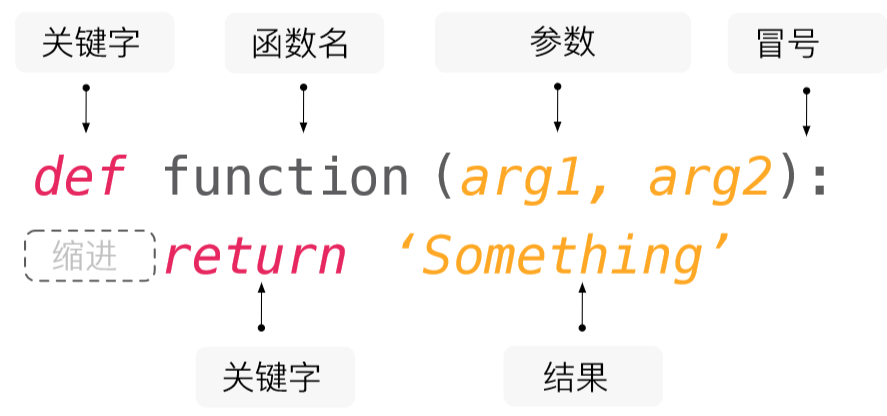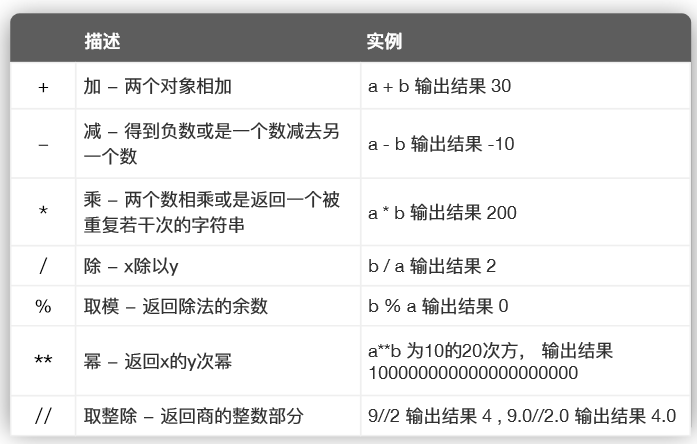Python官网中各个函数介绍的链接:https://docs.python.org/3/library/functions.html
几个常见的词:
- def (即 define,定义)的含义是创建函数,也就是定义一个函数。
- arg (即 argument,参数)有时还能看到:parameter这种写法
- return 即返回结果

咒语: Define a function named 'function' which has two arguments : arg1 and atg2, returns the result——'Something'
注意:
1) def 和 return 是关键词 (keyword)
2) 闭合括号后面的冒号必不可少,而且是英文
3) 在IDE中冒号后回车,会自动得到一个缩进。函数缩进后面的语句被称作是语句块 (block),缩进是为了表明语句和逻辑的从属关系,是Python的显著特征之一。
4) 一定要有return,如果我们把函数最后一句return去掉改成直接输出(以下用温度转换举例),会发现多出现了一个None。这是因为print函数是人为设计的函数,95.0°F实际上是调用函数后产生的数值,而None是变量C2F中被返回的数值。这就好比
def fahrenheit_converter(C): fahrenheit = C * 9/5 + 32
# return fahrenheit print(str(fahrenheit) + '°F')
C2F = fahrenheit_converter(35)
print(C2F)
# 运行结果
# 95.0°F
# None
不写return也可以顺利地定义一个函数并使用,只不过返回值是'None'罢了。
习题一:设计一个重量转换器,输入以"g"为单位地数字后返回换算成"kg"的结果。
def kilogram_converter(G): kilogram = G / 1000 return kilogram G2K = kilogram_converter(500000) print(G2K)
习题二:设计一个求直角三角形斜边长的函数(直角边为函数,求最长边)
import math def calculate_bevel_edge(a, b): c = math.sqrt(a*a + b*b) return c edge = calculate_bevel_edge(3, 4) print(edge)
(我发现我的代码出现淡淡的黄线,但不懂原因,PEP8)
| 传递参数与参数类型
传递参数的两种方式:位置参数、关键词参数
以上面求斜边为例,介绍输入方式的正确错误:
edge = calculate_bevel_edge(3, 4) // 第一种 edge = calculate_bevel_edge(a=3, b=4) // 第二种 edge = calculate_bevel_edge(a=3, 4) // 第三种 edge = calculate_bevel_edge(b=4, 3) // 错误
设计一个建议的敏感词过滤器:
一、掌握 open 和 write 的基本用法
1、在桌面创建test.txt 文件
2、使用open打开。因为我的IDE在E盘,而我的test文件在桌面,所以我写了一个C盘表示位置。
file = open('C:/Users/asus/Desktop/test.txt','w') file.write('Hello world')
二、设计函数
传入参数 name 与 msg 就可以控制在桌面写入的文件名称和内容的函数 test,这就是不需要return 也可以发挥作用的函数
def test_create(name, msg): desktop_path = 'C:/Users/asus/Desktop/' full_path = desktop_path + name + '.txt' file = open(full_path,'w') file.write(msg) file.close() print('Done') test_create('hello','hello world')
三、敏感词过滤函数
def text_filter(word, cencored_word = 'lame', changed_word = 'Awesome'): return word.replace(cencored_word, changed_word) text_filter('Python is lame!')
四、将以上两个函数合并
def text_filter(word, cencored_word = 'lame', changed_word = 'Awesome'): return word.replace(cencored_word, changed_word) def test_create(name, msg): desktop_path = 'C:/Users/asus/Desktop/' full_path = desktop_path + name + '.txt' file = open(full_path,'w') file.write(text_filter(msg)) file.close() print('Done') test_create('hello','Python is lame!')
最后,Python解决数学问题可以用到的一些符号
